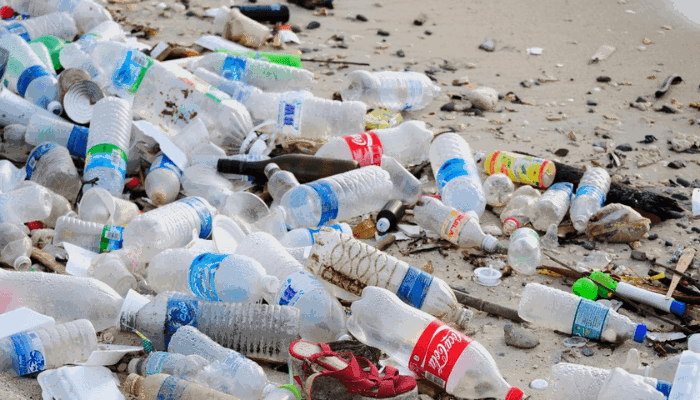
- Less Than 10% Of Plastics Recycled As Nigeria Grapples With Waste Management
- Rwandan Government Supporting Local Factories After Banning Use Of Plastics
By Edu Abade
Multinational makers of soft drinks namely: Coca-Cola, SevenUp, Nestle and other packaged liquid and solid drinkable and edible products have been indicted for contributing to what has been described as the hydra-headed plastic pollution due to multiple economic interests and world politics as promoted by the Global North.
Plastics, which are essentially pet bottles and bags comprising polymer materials made up of chemical additives end up as wastes in landfills and oceans across the world just as fossil fuels release carbon dioxide into the atmosphere causing huge greenhouse emissions.
A coalition of environmental groups under the aegis of the Global Alliance for Incinerator Alternatives (GAIA) including the Community Development Advocacy Foundation (CODAF), Global Initiative for Environment and Reconciliation (GIER) in Rwanda, Sustainable Research and Action for Environmental Development (SRADev Nigeria) and Center for EarthWorks in collaboration with the Environmental Defenders Network (EDEN) and Renevlyn Development Initiative (RDI), gave the verdict during a Webinar with the theme: Beyond the Plastics Ban.
In his opening remarks, Executive Director of RDI, Philip Jakpor, who moderated the virtual meeting, recalled that plastic was created by Sten Gustaf Thulin in 1959 to be used several times compared to using paper bags, adding that at the time, no one envisaged that they would become a major challenge to the environment.
“The current trend of using plastic bags has turned into single-use plastic bags that do not easily decompose. It has become so bad that some dead fish plastics were found. Medical experts also warn about plastics and plastic particles in our food. Plastic as you also know is a product from fossil fuels.
“Globally, the increase in plastic waste is growing very rapidly and in 2021, the Organization for Economic Cooperation and Development (OECD) noted that there were 460 million tons of plastic used compared to 353 million tons in 2000,” he said.
He noted that the statistics have grown faster after that and that an important issue that remains with plastic use is the issue of waste generation, wondering: Where do they end? How dangerous are they? How do we switch to a more sustainable alternative or what we should instead call a solution?
Speaking, Clean Energy Campaigner for GAIA Africa, Weyinmi Okotie, stated that it was important for well meaning groups and individuals to discuss the future of Africa with regard to plastic pollution, insisting that it was proper to put Lagos and other states of the federation on the right path to completely eliminate plastic wastes from Nigeria and Africa.
In his intervention, CODAF Director of Campaigns and Administration, Ubrei Joe-Mariere, disclosed that as of 2023, over 400 million tons of plastic are produced globally each year, adding that since its mass production began in the 1950s, the world has generated around 8.3 billion metric tons of plastic, much of which has ended up in landfills, the environment or the ocean.
He noted that only about 9 percent of all plastics ever produced have been recycled, while the majority ends up in landfills or the environment, with around 12 percent being incinerated.
“An estimated 8 million tons of plastic waste enter the oceans yearly, which is equivalent to dumping a garbage truck of plastics into the sea per minute. Following this trajectory, Nigeria is one of the largest consumers of plastics in Africa, with millions of tons of plastic wastes generated annually.
“Nigeria struggles with waste management with less than 10 percent of plastic wastes being recycled, because the country lacks adequate recycling and collection facilities, resulting in most of the waste ending up in landfills or the environment.
“In the coastal areas, plastic waste contributes to marine pollution, affecting fisheries and livelihoods. Inland, plastic waste clogs drainage systems, exacerbating flooding problems, particularly in cities like Lagos and Benin City, Edo State,” he stated.
Joe-Mariere also argued that single-use plastics contribute substantially to climate change due to their entire lifecycle from fossil fuel extraction, production and transportation, to their disposal and the environmental degradation they cause.
“Addressing the plastic problem is not only about reducing pollution but also about mitigating climate change by cutting down on the emissions associated with the plastic lifecycle. Efforts to reduce single-use plastic consumption, improve recycling rates, and develop sustainable alternatives are crucial in the fight against climate change,” he stressed.
Citing the success of the ban on plastics in Rwanda, Project Assistant of GIER, Emelyn Ituze, stated that since introducing the law banning plastic bags, the Rwandan government began supporting local factories that started the transition to producing materials made from bamboo, paper and other alternatives to plastics.
“Paper shopping bags are now taking the place of plastic bags in shopping packaging due to the fact that they can get decomposed in a short period, as the people adopted the reusable bags while going to the market.
“Citizens behavior has changed and the use of plastic materials has been greatly reduced and plastic bags have become almost nonexistent in Rwanda and cleanliness is evident all over the city of Kigali and other urban areas of the country that also attracted tourists to Rwanda.
“Banning plastics made it easy for the waste pickers because the separation of waste was not easy when plastic bags waste were mixed with other wastes. Many of the plastic bags were imported and when they were banned, local factories started making paper bags, which increased their income and boosted employment and of course, our economy is growing,” she said.
On his part, Executive Director of SRADev Nigeria, Dr. Leslie Adogame, whose presentation focused on the global plastics treaty, said so far, the discussions were going well but have been dogged by interests of countries like China and the United States of America.
“Being the powerful countries of the Global North, they are ready to arm twist other regions, especially Africa, but the African bloc has remained steadfast in the negotiations in ensuring that the talks address the crucial issues that concern the environment and Africa.
Other speakers who made presentations during the Webinar are, Executive Director of EDEN, Barrister Chima Williams, Executive Director of CODAF, Benin Richard and Executive Director, Center for EarthWorks, Benson Dotun Fasanya.
They maintained that while plastics constitute grave environmental hazards for Africa and the world due to their chemical components, most people on the streets of Lagos, Kigali and other African cities are not adequately informed about the dangers of plastic wastes, insisting that the menace of plastics remain a huge burden in Nigeria and the world at large.
Maintaining that the Waste-to-Energy incinerator plants being planned for parts of Lagos remain an unsustainable alternative, they argued that the industry behind the plastic waste burden should take responsibility and be accountable for the environmental impacts their activities were causing from production, transportation and utilization of their products.
“The greatest harms are done by the invisible and nameless plastic producers and whereas people are largely unaware of how plastics affect their health and well being, a just transition from plastic wastes must carry along all segments of the society,” they concluded.











